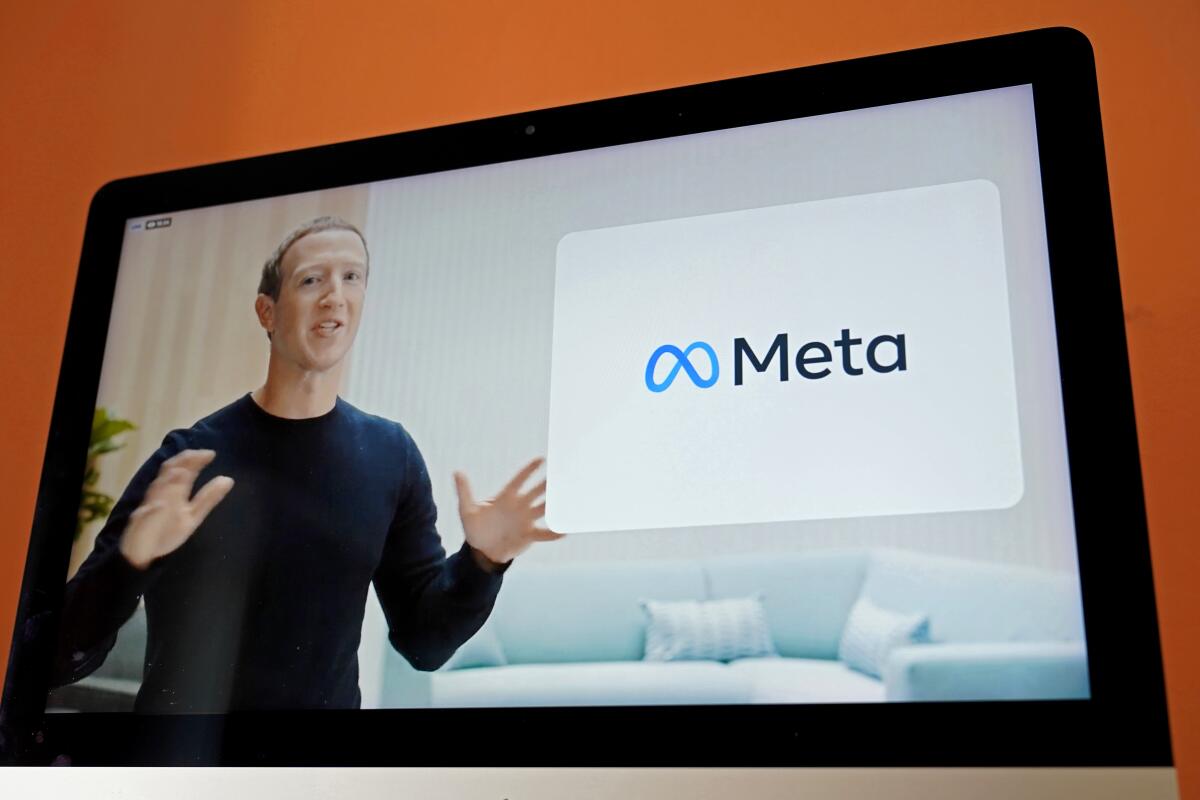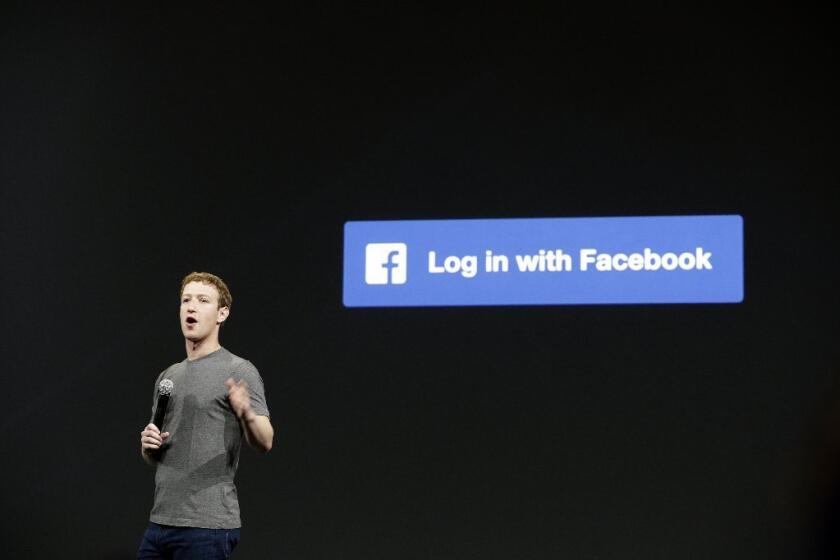A flailing Mark Zuckerberg wants Facebook to pivot to video — again

- Share via
If the old saw is true about insanity defined as doing the same thing over and over again and expecting a different result, what are we to think about Mark Zuckerberg’s latest idea to save his company?
As reported by Bloomberg, Zuckerberg on Thursday convened an all-hands virtual meeting at Meta Platforms, the parent of Facebook, and urged employees to focus on the company’s short-video service. Dubbed Reels, the service is a copycat of TikTok, the enormously popular video social media platform.
If Zuckerberg is serious about this, it’s an indication that he may be out of ideas about how to keep his company growing. The last time Facebook went strongly in for video, the outcome was disastrous. More on that in a moment.
Unless our civilization fundamentally collapses, we will never give up writing and reading.
— Tech writer Tim Carmody, advising caution about video in 2016
The urgency of Zuckerberg’s address to the troops wasn’t hard to understand. The stock market absolutely slaughtered Meta shares in Thursday’s trading on Nasdaq. The shares fell $85.24, or 26.4%.
The plunge in market capitalization of $251 billion is an unprecedented one-day decline not merely for the company but for the U.S. stock market overall. Meta shares also took down broader market indexes, with the tech-heavy Nasdaq composite falling 3.74% and the Standard & Poor’s 500 index giving up 2.44%.
Get the latest from Michael Hiltzik
Commentary on economics and more from a Pulitzer Prize winner.
You may occasionally receive promotional content from the Los Angeles Times.
Meta’s market ills developed after the company reported unexpectedly poor results for the fourth quarter of 2021 and delivered a gloomier outlook than investors expected.
Zuckerberg signaled to investors that the company’s traditionally stronger advertising platforms were showing their age and suffering from privacy enhancements implemented by Apple for iPhone and iPad users. The Apple changes will cost Meta as much as $10 billion in revenue this year, or about 8.5% of the company’s 2021 revenue.
What may be most intriguing about Zuckerberg’s response was his suggestion that the company again pivot to video. This isn’t his first effort to redefine Facebook’s market. In October, when he rechristened the company as Meta Platforms, he said the name signified the company’s new focus on virtual-reality devices.
It’s proper to recall what happened the last time the company promoted video as its future.
That was in 2016. Facebook executive Nicola Mendelsohn shook up the online world by stating, “If we look already, we’re seeing a year-on-year decline on text.... If I was having a bet, I would say: video, video, video.”
Mendelsohn said that was because “the best way to tell stories in this world, where so much information is coming at us, actually is video. It conveys so much more information in a much quicker period. So actually the trend helps us to digest much more information.”
Facebook executive Nicola Mendelsohn shook up the online-o-sphere earlier this week with one of those offhand declarations that sound superficially profound for a moment or two but are vacuous at their core.
Mendelsohn, as was evident to many observers even at the time, was blowing smoke. Although Facebook plainly had made a big commercial bet on video, in the real world she was 100% wrong.
Video is a low-information and linear medium: You have to watch an entire clip, generally in real-time, to glean all the pertinent information it contains. A block of text, however, can be scanned for the important information in a fraction of the time. Video requires nearly full attention; text can be absorbed while a reader is accessing other media such as music.
As tech writer Tim Carmody observed in a response to Mendelsohn, “Text is surprisingly resilient.... It’s cheap, it’s flexible, it’s discreet. Human brains process it absurdly well.” He concluded that “unless our civilization fundamentally collapses, we will never give up writing and reading.” He was right about that.
More pertinent to Meta’s proposed strategy, Facebook’s pivot to video proved to be a disaster for the media and advertising industries as they followed the company, then a dominating influence in those worlds, over the cliff.
As I observed in 2019 when the consequences were evident, based on what Facebook described as a commitment to become an “all video” platform, media companies dependent on its audience of roughly 2 billion leaped whole-hog into video production.
Hiltzik: Facebook’s bogus video claims just cost it $40 million, but they caused much more damage
Facebook’s video viewer statistics were false, but led to disastrously bad decisions by advertisers and media companies.
News organizations laid off text-oriented reporters and editors by the score, making room for videographers and producers. Many of those organizations quickly discovered that, Facebook’s claims notwithstanding, they were feeding their own audiences a product they didn’t want. Website traffic cratered.
Within about a year, several online publishers that had pivoted to video were retrenching again — in part because Facebook had decided to downplay videos from outside sites on its own pages.
Advertisers alleged in a lawsuit that Facebook had been feeding them bogus statistics on viewership of video ads for years. The company settled the case in 2019 for $40 million.
It’s possible that the online marketplace has evolved since then, and video is again the flavor of the month, or year. But despite Zuckerberg’s concerns about TikTok, there are hints that TikTok’s variety of online video may not be able to provide all the nourishment that broad audiences crave and advertisers value.
Many TikTok clips are about 15 seconds long, which may be the optimum length for the service’s youthful on-the-go viewership, though they can be strung together to produce videos of up to three minutes.
So perhaps Zuckerberg has it right. But history counsels skepticism. What he’s saying today isn’t all that different from what he was saying five years ago, when he was proclaiming a “new golden age of video” that never came about.
More to Read
Get the latest from Michael Hiltzik
Commentary on economics and more from a Pulitzer Prize winner.
You may occasionally receive promotional content from the Los Angeles Times.












